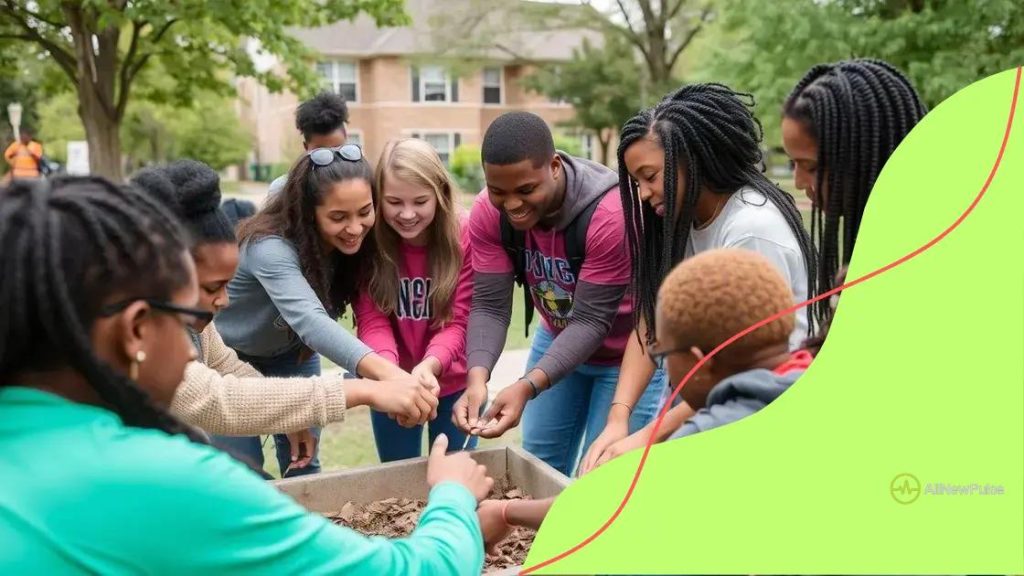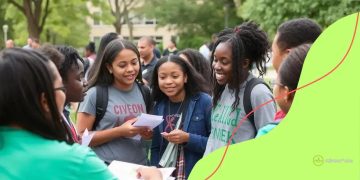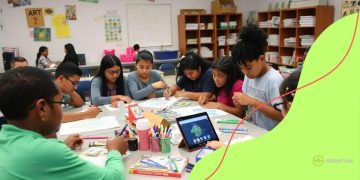Promoting civic engagement through education is essential

Promoting civic engagement through education involves integrating civic topics into the curriculum, encouraging community projects, and fostering active participation, which empowers students to become responsible citizens.
Promoting civic engagement through education is not just a trend; it’s a vital part of nurturing responsible citizens. Have you considered how education shapes our ability to engage effectively in democracy? Let’s dive into this important topic.
Understanding civic engagement and its importance
Understanding civic engagement is vital for fostering active and informed citizens. It refers to the ways individuals participate in their community and the democratic process. Engaging with others through various activities not only strengthens communities, but it also enriches the lives of those involved.
People often wonder why civic engagement matters. The truth is, it impacts our society in numerous ways. By being active, citizens can influence decisions that affect their lives. This can lead to improved public services, enhanced educational opportunities, and a stronger sense of community.
Benefits of Civic Engagement
There are several key benefits to nurturing civic engagement:
- Improved community well-being and resilience.
- Greater awareness of community issues and solutions.
- Enhanced relationships between community members.
- Increased trust in public institutions and governance.
When individuals feel connected to their communities, they’re more likely to take initiative. This includes volunteering, voting, or participating in local events. Engaging in such activities creates a ripple effect—individuals inspire others to get involved as well.
Moreover, education plays a fundamental role in promoting civic engagement. Schools can teach students about their rights and responsibilities as citizens. By encouraging discussions around current events and local issues, educators prepare young people to participate actively in their democracy.
The Role of Education
Educational initiatives can significantly influence civic participation:
- Service learning programs provide hands-on experience.
- School-based civic education encourages open dialogues.
- Extracurricular activities foster teamwork and leadership.
By implementing effective educational strategies, we can empower future generations to become engaged citizens. Ultimately, understanding civic engagement equips individuals with the knowledge and tools they need to make a difference.
Educational initiatives fostering civic participation
Educational initiatives that foster civic participation are critical for building engaged communities. These programs provide opportunities for individuals to learn about their rights and responsibilities, encouraging them to take an active role in society. By incorporating real-world applications into education, students can connect classroom learning with community action.
One effective way to promote civic participation is through service learning. This approach allows students to work on community projects, where they apply their knowledge while addressing local issues. Participation in these projects not only enhances students’ understanding of civic responsibility but also strengthens their connection to the community.
Types of Educational Initiatives
There are various types of initiatives that can increase civic participation:
- Community Workshops: These workshops educate people about governance, community issues, and activism.
- Student Government Programs: Allowing students to participate in student governance teaches them about leadership and responsibility.
- Simulation Activities: Programs that simulate government processes help students understand civic duties.
- Public Speaking and Debate Clubs: These clubs develop vital skills needed for effective communication and advocacy.
In addition to structured programs, integrating civic education into existing curricula is essential. Teachers can facilitate discussions on current events, encouraging students to express their views. Such interactions can cultivate a sense of ownership and accountability towards the community.
Moreover, after-school programs and extracurricular activities also play an important role. By encouraging participation in volunteer work, students can gain hands-on experience in civic engagement. This balance of learning and active involvement enriches the educational experience, preparing youth for future roles as informed citizens.
Challenges in promoting civic engagement through education

Despite the numerous benefits of promoting civic engagement through education, several challenges can hinder these efforts. Understanding these obstacles is essential for developing effective strategies to overcome them. Often, misinformation or lack of awareness about civic issues can lead to disengagement.
One significant challenge is the limited access to quality educational resources in many communities. Without proper materials and training, teachers may struggle to effectively teach students about their civic responsibilities. This can lead to students feeling unprepared to engage in community matters.
Key Challenges
Some key challenges in promoting civic engagement include:
- Socioeconomic Barriers: Low-income communities may lack access to civic education programs.
- Curriculum Limitations: Some schools may prioritize core subjects over civic education, limiting students’ exposure.
- Parental Involvement: Lack of support from parents can diminish students’ interest in civic activities.
- Political Polarization: Divided political views can create an environment where discussions about civic issues are discouraged.
Another hurdle is the disconnect between educational content and real-world application. Students may learn about civic responsibilities but struggle to see how this knowledge translates into action. Bridging this gap is crucial for fostering a culture of active citizenship.
Additionally, educators may face challenges in facilitating difficult conversations around sensitive civic topics. Discussions about race, inequality, and governance can be uncomfortable, but they are necessary for comprehensive civic education. Teachers need support and resources to navigate these discussions effectively.
Success stories: communities thriving through engagement
Success stories of communities thriving through engagement showcase the powerful impact of active citizenship. These stories highlight how ordinary people unite to address local challenges and foster positive change. When citizens come together, they can create vibrant, supportive environments that improve lives.
One remarkable example is the community of XYZ, where residents banded together to revitalize their local park. Through fundraising efforts and volunteer work, they transformed a neglected space into a beautiful area for recreation. This project not only beautified the neighborhood but also encouraged outdoor activities and community gatherings.
Impactful Community Engagements
Several key factors contribute to the success of these thriving communities:
- Collaboration: Working together enhances resources and ideas.
- Inclusion: Involving diverse groups fosters a sense of belonging.
- Education: Providing civic education empowers residents to take action.
- Celebration: Recognizing achievements keeps morale high and encourages further involvement.
Another inspiring story comes from ABC town, where local schools partnered with community organizations. They launched a campaign to improve literacy rates in underprivileged areas. By creating after-school tutoring programs and reading events, they have seen significant improvements in student performance and community engagement.
These examples show that when people are actively engaged in civic activities, the benefits extend beyond immediate goals. Improved public spaces enhance community pride and belonging, while educational initiatives create a more informed populace ready to participate in democracy. As a result, communities become stronger, more resilient, and better equipped to face future challenges.
Practical steps for educators to inspire civic involvement
Educators play a crucial role in inspiring civic involvement among students. By implementing practical steps in the classroom, teachers can encourage active participation and create informed citizens. Simple strategies can make a profound impact on how students view their role in the community.
One effective approach is to integrate service learning into the curriculum. Service learning connects academic lessons with community service projects. This hands-on experience enables students to apply what they learn in school to real-world situations, fostering a greater sense of responsibility.
Engagement Strategies
Here are key strategies educators can use to inspire civic involvement:
- Discuss Current Events: Regularly include discussions on local and national issues in lessons to enhance awareness.
- Create Projects: Design projects that focus on solving community problems, allowing students to explore real-life applications.
- Encourage Debates: Organize debates on civic topics to develop critical thinking and communication skills.
- Invite Guest Speakers: Bring in local leaders and activists to share their experiences and insights with students.
Additionally, encouraging participation in school clubs and extracurricular activities related to civic engagement can further enhance students’ interests. For instance, students might join a debate club, student government, or community service organizations that promote volunteerism.
Furthermore, educators should model civic involvement themselves. By participating in community events and discussing their experiences, teachers can inspire students to take similar actions. This creates a culture of engagement where students learn the value of contributing to their communities.
Lastly, providing resources and teaching students about voting and civic rights empowers them. Understanding how their voices can influence democracy is key to fostering a new generation of engaged citizens who care about their communities.
In summary, promoting civic engagement through education is vital for developing active and responsible citizens. By implementing practical strategies like service learning, discussing current events, and encouraging community involvement, educators can inspire students to participate in their communities. Together, these efforts create stronger, more vibrant communities where everyone has a voice. When students understand their role and the impact they can make, they are more likely to engage in civic activities and contribute positively to society. Let’s cultivate a new generation of thoughtful and engaged citizens!
FAQ – Frequently Asked Questions about Promoting Civic Engagement through Education
Why is civic engagement important in education?
Civic engagement is important as it helps students understand their rights and responsibilities, promoting active participation in their communities.
What are some effective strategies for educators?
Effective strategies include service learning, discussing current events, and inviting guest speakers to engage students in civic topics.
How can community projects enhance civic involvement?
Community projects allow students to apply their learning in real-world situations, fostering a sense of responsibility and connection to their community.
What role do students play in promoting civic engagement?
Students play a crucial role by participating in discussions, volunteering, and taking leadership positions which encourage their peers to be active citizens.





